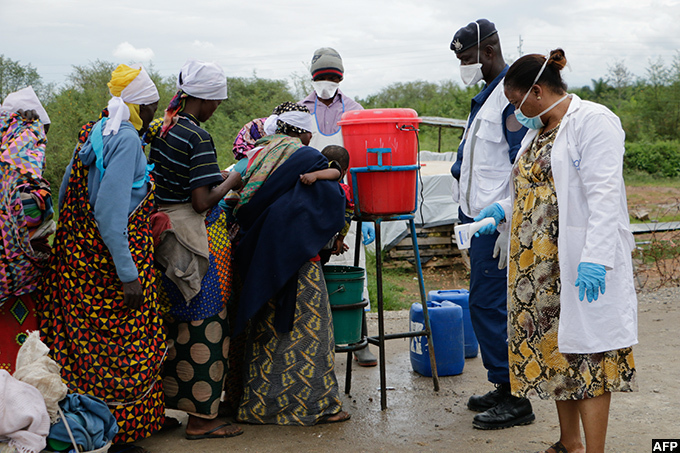DR Congo city locks down as more African nations report deaths
More African countries were expected to announce tough confinement measures after sealing their borders and closing public places.
HEALTH VIRUS
Democratic Republic of Congo's second-largest city began a 48-hour lockdown and three more African countries led by Nigeria announced coronavirus fatalities Monday as the disease extended its reach south of the Sahara.
More African countries were expected to announce tough confinement measures after sealing their borders and closing public places.
Security forces were deployed in the city of Lubumbashi, in southeastern DRC, where the streets were deserted and stores were closed, an AFP journalist said.
The move came after two people with suspected coronavirus arrived on Sunday on a scheduled flight from the capital Kinshasa, the authorities of Haut-Katanga province said.
Fast-track tests were carried out on them and the results were positive.
"A 48-hour-long total confinement has been declared overall Haut-Katanga province as of Monday," Governor Jacques Kyabula said in a statement.
The measure "will enable the authorities to identify the other passengers aboard this plane for quarantining," he said.
The plane was carrying 77 passengers, the authorities said.

Haut-Katanga, rich in copper and cobalt, is one of 26 provinces in the DRC, the largest country in sub-Saharan Africa.
The DRC has recorded 30 cases of coronavirus since March 10, two of them fatalities.
Four legislators in Kinshasa on Monday urged President Felix Tshisekedi to place the sprawling capital "in quarantine and isolate it from the rest of the country."
- Rising cases -
Africa has been slow to follow the terrifying rise in virus cases seen in the Middle East and Europe.
The reason for this is unclear, but many African countries have used the precious time to impose travel restrictions, close schools and appeal for social distancing.
Now, though the numbers are now rising significantly.
According to a toll compiled by AFP, the number of known cases across the continent -- including North Africa -- stood at more than 1,600 on Monday, of which 50 have been fatal.
The first detected case south of the Sahara was announced in Lagos on February 28, and the first death was reported in the Sahel state of Burkina Faso last Wednesday.
It was then followed by fatalities in Gabon, the DRC and Mauritius.
On Monday, three more countries added to this list: Nigeria -- the most populous country in Africa -- as well as The Gambia in western Africa, and Zimbabwe in the south.
All three deaths were of individuals who had arrived after making extensive trips abroad.
The Nigerian fatality was a 67-year-old man who had returned from medical treatment in Britain and had cancer and diabetes, the Nigeria Centre for Disease Control said.
The death in The Gambia was of an itinerant 70-year-old teacher from Bangladesh who had arrived in from neighbouring Senegal.
"He was said to have travelled from six other countries where he was carrying out similar preaching," the Gambian health ministry said in a statement.
In Zimbabwe, the ministry of health reported the death of a 30-year-old man who had travelled to New York last month and returned home on March 9, transiting through Johannesburg in neighbouring South Africa.
- Peril for Africa -
In West Africa, Senegal and Ivory Coast were expected to order lockdown measures later Monday, while in Burkina Faso, a security source said the authorities "were thinking more and more about total confinement of the population for two or three weeks."
Rwanda late Saturday barred all "non-essential" movement, while the Indian Ocean island of Mauritius began a 14-day lockdown on Friday.
Health experts have sounded loud and repeated warnings about Africa's vulnerability to coronavirus.
Crowded shantytowns, poor sanitation and decrepit health infrastructure offer ideal opportunities for the lethal microbe.
"The system itself is overstretched and inadequate to deal with a coronavirus epidemic," Zimbabwean doctor Norman Matara told AFP last week.
He said there were only eight functioning intensive care and two isolation units in the whole of his country.
But lockdowns too can have a catastrophic in countries where there is little or no social safety net to help people buy food or pay their bills.
"in reality, partial or total confinement could have disastrous effects for the African continent," Cameroonian writer Calhixte Beyala said on her Facebook page.